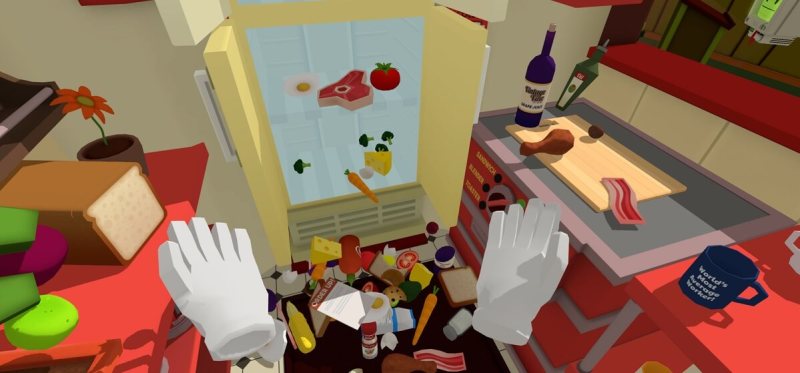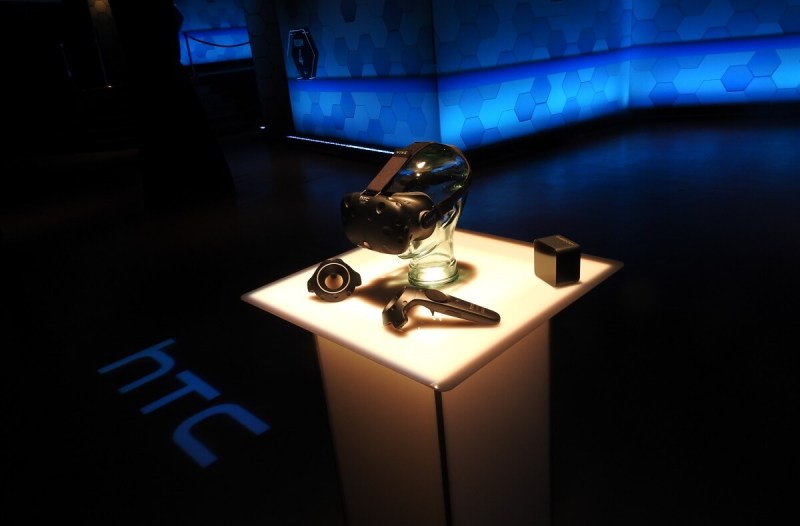If you don’t like your job in real life, maybe it will be better in virtual reality. That outlandish notion is the idea behind Job Simulator, a virtual reality game that lets you crazily perform familiar tasks in places like a kitchen, an office, or a convenience store.
Owlchemy Labs is creating Job Simulator for the HTC Vive virtual reality headset, as well as for the Oculus Touch system and PlayStation VR. The title is one of a dozen releases that I saw for the HTC Vive that debuts in April on the PC. The system is Valve and HTC’s bid to be a player in what could be a $30 billion industry by 2020, according to tech advisor Digi-Capital.
Job Simulator is a tongue-in-cheek VR offering that takes place in the year 2050. Robots have replaced all humans in jobs, so the JobBot simulator actually shows you what it used to be like to do a job. In a hands-on demo at an event held by Valve in Seattle, I was able to learn what it’s like to work in a gourmet kitchen as a cook. A robot dropped off its order, and I had to look at a recipe.
It’s a tactile experience, where you have to use your hands. That’s where the HTC Vive’s touch controllers come into play. You can grab things, pick them up, and move them around using the same gestures you would employ in real life. The Vive senses a space around for you to move, giving you a place to walk around in without fear you’re going to trip over something. You can perform tasks like cracking eggs. For instance, you don’t need a frying pan. You can cook eggs by cracking them and putting them directly on the stove.
AI Weekly
The must-read newsletter for AI and Big Data industry written by Khari Johnson, Kyle Wiggers, and Seth Colaner.
Included with VentureBeat Insider and VentureBeat VIP memberships.
I burned my first egg. The robot said, “That’s OK. We’ll serve it anyway.” So, I scooped it up and put it on a plate and rang the bell. A robot came by and took it to a table. It made me laugh. I had to slice things and grab items from the refrigerator. I made the eggs and a smoothie. That’s just the start of the fun. I also tried the office worker event as well. That one stumped me, as I didn’t realize I had to open a file cabinet under my desk and get a form there.
If you want, you can crack a wine bottle on your head and leave the glass on the floor. That’s something you would never do in real life, said Alex Schwartz, CEO and chief scientist at Owlchemy Labs in Austin, Texas, in an interview with GamesBeat.
“We started doing some very esoteric jobs at first, but we realized that the everyday jobs in a dry office cubicle [were] where the humor was,” he said. “You take the expectations and break them. The inspiration was mechanics driven. When we were invited to the VR room at Valve in October 2014, they said we would have tracked hands in VR. We tried to decide what we could do with that. It was so much fun to pick up things and knock them over.”
So Owlchemy started working on doing a physics-based title where you could do tactile tasks. The company has to figure out how to make the leap from a free demo to a paid offering. Owlchemy started work on the game in January 2015, and it was one of the first developers to get access to the Steam VR and HTC Vive developer kit. They’re making the title using the Unity game engine.
“The demo took a month, and the full game is taking over a year,” Schwartz said. “We have to think of a product that people come back to over and over. And that revolves around the humor and the social experience.”
Indeed, that’s not the first time I’ve heard that the key to success of a VR app is how social it is. If people can watch what you’re doing in VR on a big screen and laugh along with you, that could make the experience more fun and something you’d break out at one party after another.
“It’s these single-player games that you don’t expect to be a social experience,” Schwartz said. “It’s like a performance art. A crowd forms and people want to watch. We’ve seen these VR parties form.”
Owlchemy Labs has 15 employees in Austin, Texas. It has raised an undisclosed amount of money. The company was founded in 2010, and it started with non-VR PC games on Steam, as well as mobile releases.
“The VR explosion has led to growth for us,” Schwartz said.
Job Simulator will have five different jobs by the time it launches. Those include the gourmet chef, the convenience store clerk, and the office worker. Two other environments haven’t been revealed yet. The title will sell for money, and it will be a launch title on the HTC Vive. Here are some videos of Job Simulator in action.
VentureBeat's mission is to be a digital town square for technical decision-makers to gain knowledge about transformative enterprise technology and transact. Learn More


